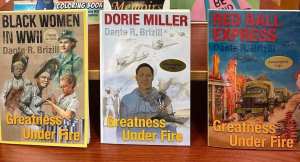By Dante R. Brizill,
Special to the AFRO
As we approach the Memorial Day weekend, it is fitting to remember the ever-vanishing WWII generation. The sense of urgency calls out to us, as they are leaving us at a rapid pace. According to the U.S. Department of Veterans Affairs, we have approximately 167,000 World War II vets left among us of the 16 million who served. Some 180 of these men and women die every day. At this rate, by 2034 they will be gone. As we ponder the ultimate sacrifices that were made to defeat Nazism and fascism, it is worth remembering the impact that the war had on Black Americans who served. The war years instilled a fighting spirit in them that would eventually lead to profound changes in America.
WWII required the participation of almost every community and family in America, and Black America was no exception. Over one million African Americans served in the war, at a time when Jim Crow and segregation was firmly entrenched in American life. How did these men and women reconcile being treated as second class citizens at home, while fighting Hitler overseas?
The Black Press was a force in 1940’s America. As a collective force, they challenged, pressured and exposed the barriers that held their people back. Their fiery editorials and commentary pulled no punches in calling for progress.
The Chicago Defender and the Pittsburgh Courier were widely read and distributed in Black America. In response to a letter from a reader in 1942, who questioned why he should serve a country that treated him as ‘half American’, the Pittsburgh Courier instituted the ‘Double V’ campaign. In essence Black America would have to fight two wars: ‘victory against Jim Crow at home and victory against our enemies overseas.
The Depression hit Black America the hardest. The defense jobs that came with the war was arguably the biggest economic stimulus in American history. Wages practically tripled overnight, and Black America wanted their share of the pie. A. Phillip Randolph, one of the godfathers of the Civil Rights movement, threatened a march on Washington, D.C. in 1941 in protest of discriminatory practices in the defense industry. Realizing what a PR disaster this could be for the United States on the world stage, President Roosevelt signed an executive order banning discrimination in the defense industry. Black women One of the biggest beneficiaries of this order. Limited to domestic and agricultural jobs before the war, Black women left kitchens and fields to work on factory floors and shipyards.
Known as the ‘Black Rosie’s,’ 600,000 courageous women served their country at home and abroad. Welder Josie Lucille Owens aided construction efforts of the Liberty Ship, SS George Washington Carver during World War II.
Even though Black men served honorably in every war since the American Revolution, the military was hostile and indifferent to their service at the dawn of WWII. The Navy limited the service of brave Black men who answered the call of duty to menial jobs in military kitchens and latrines. Black soldiers were refused combat training– even as they served in war zones.
The Marines did not open their doors to Black men initially, but they finally relented in 1943. One of my grandfathers was a Montford Point Marine. In the few combat roles that Black soldiers received, they shined.
The Tuskegee Airmen were considered an “experiment” and expected to be a failure, however they had an exceptional combat record, proving the doubters wrong.
Before the term “supply chain” became a part of our daily vernacular, drivers of the Red Ball Express, a truck convoy operation led predominantly by Black soldiers, alleviated a crucial supply bottleneck of much needed supplies in the weeks after D-Day.
Throughout the war, Black soldiers challenged segregation and unfair treatment. One incident involved Jackie Robinson who narrowly escaped being court-martialed for refusing to give up his seat on a bus at Fort Hood, Texas. Three years later, Robinson broke the color barrier in Major League Baseball.
WWII exposed Blacks to the possible. It was possible to be paid a living wage. If they fought for a better world overseas, why couldn’t they have one here at home? If British civilians could treat them as equals and invite them into their homes for tea, why couldn’t they receive equal treatment at home?
Discriminatory housing, voting, transportation and educational practices faced new challenges by Black veterans in the post war years, as the tolerance level for these injustices dropped to zero after the war. Some of the lions of the Civil Rights movement were Black veterans such as Medgar Evers and Ralph Abernathy. Civil Rights groups such as the NAACP saw an increase in membership during the war years.
The wartime experiences of Black men and women planted the seeds that brought about racial progress and justice in the United States.
America’s success in World War II on the world stage and the contributions of Black soldiers– both male and female– are undeniably interconnected. It should not and will not go unnoticed.
Author Dante R. Brizill is a Black nonfiction writer who has authored three children’s books about the achievements of Black Americans during World War II. In addition to being an accomplished nonfiction author, Brizill is a history teacher at a high school in Delaware. He was born and raised in Philadelphia and now resides with his family in Townsend, Del.
The post Commentary: The time is now to recognize the Black men and women of World War II appeared first on AFRO American Newspapers .











